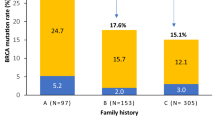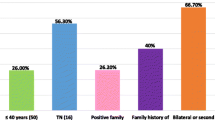Abstract
Possession of a BRCA1/2 mutation increases risk of contralateral breast and ovarian cancer recurrence and may have an impact on health management decisions, such as imaging screening, preventive surgical interventions and systemic therapies. A hospital-based study was conducted to assess the frequency and spectrum of pathogenic germline BRCA1 and BRCA2 mutations in Polish women with familial and nonfamilial breast cancer. Genomic DNA was extracted from 1581 women with breast cancer and from 2225 healthy individuals. For genoty** BRCA1 (5382insC, T300G, 3819del5, 185delAG, C5370T, 3875del4, 3896delT, 4153delA, 4184del4, 4160delAG, G5332A) mutations and BRCA2 (G1408T, 5467insT, 6174delT, 6192delAT, 6675delTA, 8138del5, 9152delT, C9610T, 9630delC) mutations, a Custom TaqMan (Applied Biosystems) PCR-based technology was adopted. A BRCA1 mutation was found in 26 and 12.5 % of women with familial breast cancer and in 13 and 8.3 % nonfamilial (sporadic) breast cancer, diagnosed before or after 50 years of age, respectively. A much lower frequency of BRCA2 mutation was observed. The predominance of seven BRCA1 mutations (5382insC, T300G, 3819del5, 185delAG, C5370T, 3875del4, 4153delA) studied in the Masovian voivodeship population confirmed a strong founder effect for BRCA1 mutations in the Polish population, and the results of BRCA2 testing confirmed a high diversity in the studied pathogenic mutations in BRCA2 gene. We propose offering inexpensive testing for the presence of BRCA1 founder mutations to all Polish women at the time of initial breast cancer diagnosis, regardless of the patient’s family history or age of disease onset.
Similar content being viewed by others
References
Wojciechowska U, Didkowska J, Zatoński W (2010) Cancer in Poland in 2008. 1–124. http://www.onkologia.org.pl/doc/Nowotwory2008.pdf
Ostrowski J, Wyrwicz LS (2009) Integrating genomics, proteomics and bioinformatics in translational studies of molecular medicine. Expert Rev Mol Diagn 9:623–630. doi:10.1586/erm.09.41
Kenemans P, Verstraeten RA, Verheijen RHM (2004) Oncogenic pathways in hereditary and sporadic breast cancer. Maturitas 49:34–43. doi:10.1016/j.maturitas.2004.06.005
Foulkes WD (2008) Inherited susceptibility to common cancers. N Engl J Med 359:2143–2153. doi:10.1056/NEJMra0802968
Antoniou A, Pharoah PDP, Narod S, Risch HA, Eyfjord JE et al (2003) Average risks of breast and ovarian cancer associated with BRCA1 or BRCA2 mutations detected in case series unselected for family history: a combined analysis of 22 studies. Am J Hum Genet 72:1117–1130. doi:10.1086/375033
Friedman E, Kotsopoulos J, Lubinski J, Lynch HT, Ghadirian P et al (2006) Spontaneous and therapeutic abortions and the risk of breast cancer among BRCA mutation carriers. Breast Cancer Res 8:R15. doi:10.1186/bcr1387
Górski B, Jakubowska A, Huzarski T, Byrski T, Gronwald J et al (2004) A high proportion of founder BRCA1 mutations in Polish breast cancer families. Int J Cancer 110:683–686. doi:10.1002/ijc.20162
Brozek I, Cybulska C, Ratajska M, Piatkowska M, Kluska A et al (2011) Prevalence of the most frequent BRCA1 mutations in Polish population. J Appl Genet 52:325–330. doi:10.1007/s13353-011-0040-6
Ferla R, Calò V, Cascio S, Rinaldi G, Badalamenti G et al (2007) Founder mutations in BRCA1 and BRCA2 genes. Ann Oncol 18(Suppl 6):vi93–vi98. doi:10.1093/annonc/mdm234
Trainer AH, Lewis CR, Tucker K, Meiser B, Friedlander M et al (2010) The role of BRCA mutation testing in determining breast cancer therapy. Nat Rev Clin Oncol 7:708–717. doi:10.1038/nrclinonc.2010.175
Brozek I, Ratajska M, Piatkowska M, Kluska A, Balabas A et al (2012) Limited significance of family history for presence of BRCA1 gene mutation in Polish breast and ovarian cancer cases. Fam Cancer 11:1–4. doi:10.1007/s10689-012-9519-5
Turner NC, Reis-Filho JS (2006) Basal-like breast cancer and the BRCA1 phenotype. Oncogene 25:5846–5853. doi:10.1038/sj.onc.1209876
Tilanus-Linthorst M, Verhoog L, Obdeijn I-M, Bartels K, Menke-Pluymers M et al (2002) A BRCA1/2 mutation, high breast density and prominent pushing margins of a tumor independently contribute to a frequent false-negative mammography. Int J Cancer 102:91–95. doi:10.1002/ijc.10666
Warner E, Plewes DB, Shumak RS, Catzavelos GC, Di Prospero LS et al (2001) Comparison of breast magnetic resonance imaging, mammography, and ultrasound for surveillance of women at high risk for hereditary breast cancer. J Clin Oncol 19:3524–3531
Górski B, Byrski T, Huzarski T, Jakubowska A, Menkiszak J et al (2000) Founder mutations in the BRCA1 gene in Polish families with breast-ovarian cancer. Am J Hum Genet 66:1963–1968. doi:10.1086/302922
Skasko E, Paszko Z, Niwińska A, Kwiatkowska E, Kruczek A et al (2004) The presence of hereditary BRCA1 gene mutations in women with familial breast or ovarian cancer and the frequency of occurrence of these tumours in their relatives. Eur J Gynaecol Oncol 25:470–474
Grzybowska E, Siemińska M, Zientek H, Kalinowska E, Michalska J et al (2002) Germline mutations in the BRCA1 gene predisposing to breast and ovarian cancers in Upper Silesia population. Acta Biochim Pol 49:351–356
Skasko E, Kluska A, Niwińska A, Kwiatkowska E, Bałabas A et al (2009) Age at onset of bilateral breast cancer, the presence of hereditary BRCA1, BRCA2, CHEK2 gene mutations and positive family history of cancer. Onkologie 32:182–188. doi:10.1159/000200930
Balabas A, Skasko E, Nowakowska D, Niwinska A, Blecharz P (2010) Novel germline mutations in BRCA2 gene among breast and breast-ovarian cancer families from Poland. Fam Cancer 9:267–274. doi:10.1007/s10689-010-9338-5
Purcell S, Neale B, Todd-Brown K, Thomas L, Ferreira MAR et al (2007) PLINK: a tool set for whole-genome association and population-based linkage analyses. Am J Hum Genet 81:559–575. doi:10.1086/519795
Gadzicki D, Evans DG, Harris H, Julian-Reynier C, Nippert I et al (2011) Genetic testing for familial/hereditary breast cancer-comparison of guidelines and recommendations from the UK, France, the Netherlands and Germany. J Community Genet 2:53–69. doi:10.1007/s12687-011-0042-4
Pharoah PDP, Antoniou A, Bobrow M, Zimmern RL, Easton DF et al (2002) Polygenic susceptibility to breast cancer and implications for prevention. Nat Genet 31:33–36. doi:10.1038/ng853
Acknowledgments
This work was supported by PBZ-MNiSW-05/I/2007/01 grant from Polish Ministry of Science and Higher Education.
Conflict of interest
The authors declare that they have no conflict of interest.
Ethical standards
The study was approved by the local ethics committee (Medical Center for Postgraduate Education and Cancer Center, Warsaw, Poland), and all the participants provided appropriate consent. The study protocol conformed to the ethical guidelines of the 1975 Declaration of Helsinki.
Author information
Authors and Affiliations
Corresponding author
Additional information
Pawel Gaj and Anna Kluska contributed equally to this work.
Rights and permissions
About this article
Cite this article
Gaj, P., Kluska, A., Nowakowska, D. et al. High frequency of BRCA1 founder mutations in Polish women with nonfamilial breast cancer. Familial Cancer 11, 623–628 (2012). https://doi.org/10.1007/s10689-012-9560-4
Published:
Issue Date:
DOI: https://doi.org/10.1007/s10689-012-9560-4




